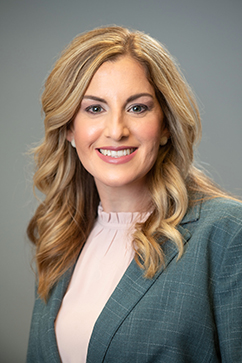Mariners Gain Sealift Experience Through MSPs
By Ken Kolb, Special to The Waterways Journal
Attacks on cargo ships in the Red Sea and their disruptive impact on global shipping underscore that the open ocean is a dangerous place. The United States needs citizen mariners with experience operating in contested waters, and the (MSP) ensures America has the crews necessary to engage in sealift operations should the need arise.

Jeanne Ferrer knows this well, having sailed on an MSP ship. The lessons she learned, including a stint sailing in pirate-infested waters, serve her well in her roles in the maritime industry back home.
Ferrer is a pilot on the Lower Mississippi River for the Crescent River Port Pilots’ Associationpp, an officer in the Navy Reserve and a commissioner at the Port of New Orleans. During her career, she has managed difficult scenarios on bridges from Pearl Harbor, Hawaii, to Singapore. But it was one experience aboard an MSP vessel that taught Ferrer the true value of proactive risk management.
The MSP, launched in 1996, is a federal program that provides financial incentives to U.S.-flagged ships to engage in foreign trade. Managed by the Maritime Administration (MarAd), the MSP ensures that the military has access to a fleet of 60 ships with a diverse range of intermodal capacities and a constant pool of at least 2,400 citizen mariners to sail them.
While it is certainly cheaper for American businesses to outsource their routine commercial shipping needs to international crews sailing on foreign-flagged vessels, those short-term savings come at a cost: our nation’s capacity, during times of disaster or military need, to conduct strategic sealift operations with our own ships and our own crews. The MSP offers American mariners the chance to gain experience in every aspect of international shipping, including delivering goods in contested waters.
Ferrer’s education in managing risk at sea took place in Port Harcourt, Nigeria, where ship hijackings still run rampant. In September 2012, Ferrer was the chief mate of the Ocean Freedom, a U.S.-flagged heavy lift cargo ship and voluntary member of the MSP fleet. Her job was to oversee the loading and unloading of cargo. As soon as she learned of the ship’s destination, her mind immediately turned to the case of Captain Richard Phillips, who Ferrer served under as a cadet in the Merchant Marine Academy at Kings Point. She had followed his story closely when he was kidnapped off the coast of Somalia in 2009. Years later, Tom Hanks portrayed Phillips in the movie “Captain Phillips.”
To prepare the Ocean Freedom for all contingencies, Ferrer oversaw the onboarding of an international security team during a port call in Mauritania, as well as an additional Nigerian detail when the ship neared its destination. This proved to be a wise decision.
As the Ocean Freedom made its way to Port Harcourt, Ferrer immediately could tell something was wrong. The inner harbor was filled with abandoned ships at anchor. The rule of law was breaking down.
When the Ocean Freedom docked, it was obviously too risky to let local longshoremen aboard the ship. The unloading plan was revised. Ferrer opted to position the ship’s cargo at a staging area on the dock, where local longshoremen were then allowed to take possession of it. Though a safer strategy, the decision slowed the process considerably.
As delays dragged on, the mood among the local labor force soon turned hostile. Nigerian ports are rife with corruption. Dockworkers handling the cargo became increasingly angry with their superiors in Lagos for siphoning off profits from afar without sharing the spoils. In a power move to get a bigger cut, the longshoremen convinced local officials to prevent the Ocean Freedom from leaving by confiscating the crew’s Seaman’s Books (Seafarer Identity Documents that Ferrer and the crew needed to sail). These same port officials, knowing Ferrer was the only female officer on the ship, began inventing reasons to interview her and started asking her increasingly personal questions.
Ferrer, rather than worry or panic, kept at her work. She could not eliminate all risks, but she could make backup plans for every scenario. For example, she still had to take draft readings from the dock every day. Each time before disembarking, she ordered her chief engineer to stand on watch to warn her if trouble loomed.
One day, trouble came. What started as curious glances from a nearby crowd of longshoremen soon became menacing. When a mob began to form around her, the chief engineer made the call, and Ferrer made a run for the gangway. After that episode, the security teams doubled their patrols and stood guard outside her stateroom while she slept.
After three weeks, the Nigerian standoff with the longshoremen at Port Harcourt came to an end. The local workers received their payoffs from Lagos, and the crew’s Seaman’s Books were returned. The Ocean Freedom finally was able to set sail.
The world is a risky place, and America needs a robust base of merchant mariners ready to sail its waters. The Maritime Security Program ensures there will be an active fleet of ships ready to move American cargo at any time, to any place, but the emergency preparedness that MSP provides does not lie solely within its physical fleet. To conduct sealift operations, America needs citizen crews with experience in contested waters to get goods where they are needed and to do so quickly.
Ultimately, the MSP serves the country’s military and commercial interests. The skills and strategies merchant mariners learn abroad serve to benefit the U.S. shipping industry when they return home. Ferrer’s experience at Port Harcourt was a harrowing one at the time, but the lessons she learned managing risk as a chief mate on the Ocean Freedon make her a better river pilot, Navy Reserve officer and port commissioner today.
Ken Kolb is a professor and chair of the Department of Sociology at Furman University. He is currently writing a book about shipping.



